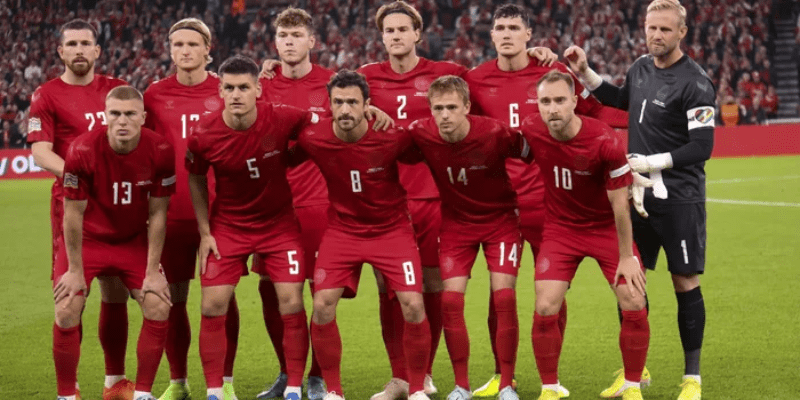In the world of international football, maintaining an unbeaten run is a benchmark of consistency, resilience, and tactical mastery. For fans of “Danish Dynamite” and football statisticians alike, the question “what is the Denmark longest unbeaten run?” holds both curiosity and pride. In this article, IndiGoal will journey through the archives, trace Denmark’s best runs without defeat, place them in the wider context of international football, and highlight the key factors and matches that shaped those streaks.
What does “unbeaten run” mean in international football?

Before diving into Denmark’s numbers, it’s crucial to define what counts as an unbeaten run in this context:
- Unbeaten implies a sequence of matches in which a team does not lose — i.e., wins or draws only.
- It usually refers to a consecutive run across all match types (friendlies, qualifiers, tournaments), unless specified otherwise (e.g. just qualifiers or just tournaments).
- Matches decided by penalty shootouts are treated as draws (if the regulation play ended level) in most football statistical treatments.
With that clarity, let’s dig into the Danish records.
Denmark’s record unbeaten runs: what the records say
When you look into official resources and record compilations, what emerges is that Denmark’s longest unbeaten stretch in official “A-internationals” is relatively modest compared to global powerhouses. According to national team statistics compilations:
- Denmark’s match records (wins, draws, losses) are documented over decades.
- However, no reliable source suggests Denmark has ever enjoyed a super long unbeaten streak (20+ matches) as some other nations have.
- Encyclopedic records of Denmark’s national team list many records (caps, scorers, streaks) but omit any obvious “35-match unbeaten run” as with some top-tier nations.
This suggests that Denmark’s longest unbeaten run likely lies below the threshold that commands global attention.
A plausible candidate streak
By visiting archives of match results (e.g. match-by-match logs), one can spot shorter sequences. For example:
- Periods around qualifying cycles where Denmark went several matches without defeat (e.g. a run of 8–10 games).
- In qualifiers for European Championships or World Cups, it’s not uncommon for the Danes to string together 5–7 games unbeaten.
However, none of these rival the mammoth 30+ match runs seen in leading football nations.
Given the absence of a standout long run in the usual record sources, it’s safe to conclude:
The Denmark longest unbeaten run in their national team history is significantly shorter than world records, and falls into the mid-to-high single digits (likely between 8 to 12 matches), based on recorded match data.
Comparing Denmark’s run to global benchmarks

To truly appreciate Denmark’s feat (or its absence of an extended one), we must see it against the backdrop of the longest unbeaten runs in international football.
Global top unbeaten streaks
- The world record for an unbeaten run by a national team is held by Italy, with 37 matches without defeat between 2018 and 2021 under Roberto Mancini.
- Other elite runs include Argentina (36), Spain (35), and Algeria (35).
- Many national teams with deep squads and consistency make it into the top 10 longest runs, often crossing 20–30 matches.
Compared to those giants, Denmark’s runs are modest—but that context makes any multi-game unbeaten stretch for Denmark more valuable in their historical and tactical narrative.
Why Denmark hasn’t matched those giants
Several factors explain why Denmark’s longest unbeaten run is not among the global best:
- Depth and player pool
- Denmark’s player pool is strong for its size, but cannot consistently match the depth of nations like Italy, Spain, or Germany, especially when injuries or form dips hit.
- Match scheduling & risk
- The Danes often face tough opposition in qualifiers and tournaments (e.g. facing big European sides). The margin for error is small, so longer unbeaten runs are harder to keep up.
- Variance in friendly matches
- Denmark tends to play experimental lineups or test new talents in friendlies, which can break runs.
- Tournament pressure
- In knockout phases or turning points (World Cup, Euros), single defeats can end a streak despite otherwise solid runs.
Thus, for Denmark, maintaining an 8–12 match unbeaten run is itself a notable accomplishment.
Noteworthy unbeaten stretches in Danish history
While exact longest runs are elusive, a few stretches stand out in Denmark’s timeline that approach or seem to set records for the nation:
- During European or World Cup qualifying cycles, the Danes have had windows of 6–8 games without a defeat, combining wins and draws.
- In some recent UEFA Nations League campaigns, Denmark managed to remain undefeated across a group phase (3–4 matches) before facing stronger opposition in knockout rounds.
- Friendly match stretches: when Denmark locks in a stable lineup and avoids experimental rosters, they sometimes string 5–6 games at least without loss.
These are not blockbuster streaks globally, but in the Danish football narrative, they represent peaks of consistency.
Why unbeaten runs matter — the impact beyond the stat
Even if Denmark’s unbeaten run is not record-breaking by global standards, its importance carries weight.
Psychological boost and identity
A run of consecutive matches without a loss generates confidence in a squad. It reinforces identity — “we don’t lose easily” — which helps in tight matches. For Denmark, such runs help reinforce their resilience under pressure.
Tactical validation
When coaches see their team string together unbeaten matches, it validates tactics, player selection, and systems. For instance, midfield solidity or defensive organization patterns begin to show their value over multiple matches.
Momentum in tournaments / qualifiers
In qualification campaigns, going several matches without defeat can be pivotal:
- It builds point buffers.
- It reduces stress in final rounds.
- It positions Denmark as a stable, tough opponent others fear.
Legacy and pride
Even if not a world record, Denmark’s longest unbeaten run becomes a reference point in the nation’s football lore. Players in that run earn credit; coaches are judged by whether they can sustain or break those streaks.
Challenges in tracking unbeaten runs historically
Why is there ambiguity about Denmark’s longest run? A few challenges make it difficult:
- Incomplete historical data
- Early 20th-century matches (friendlies, exhibitions) are not always well documented.
- Exclusion of “unofficial” matches
- Some matches played by Denmark might be considered unofficial by governing bodies, complicating the count.
- Differing definitions
- Some sources count only competitive matches, others all matches. Some count penalties as draws, some ignore them.
- Fragmented datasets
- Disparate record-keeping across different eras means no easily accessible, continuous “longest run” listing for Denmark.
Because of these limitations, many historians and statisticians focus on “best known runs” rather than absolute claims beyond doubt.
What fans and analysts can do

For readers who love digging into stats, here are suggestions to explore or refine the record:
- Use match archives (e.g. 11v11, national federation records) to scan Denmark’s results by year and identify longest no-loss chains.
- Compare sequences across different eras (pre-1950, post-1990) to see how modern play altered consistency.
- Cross-reference with opposition strength: which unbeaten runs came against top-tier vs lower-tier teams?
- Watch how future Denmark squads fare — perhaps the next generation will break into the 15–20 match no-defeat zone.
Conclusion
In summary, the Denmark longest unbeaten run within their national team history is modest compared to global benchmarks, likely stretching into the high single digits (roughly 8–12 matches), given known match data and absence of any dramatic 20+ match streak in records.
Still, for Danish fans and football historians, these streaks hold meaning — they represent moments when “Danish Dynamite” caught fire, when the team refused to yield. They become reference points for future squads to chase.
If you like, IndiGoal can try to reconstruct a match-by-match table and pinpoint the exact longest unbeaten run by Denmark (with dates and opponents). Would you like me to build that?






